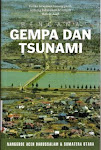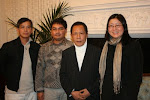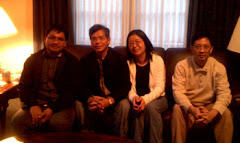
Hello Friends,
Second, we urge you to install Worldwide Vigil of 10 Years for Humanity Tragedy in May 1998 banner on your blog or web site. You will be able to download the banners of your choices by clicking “Banners” (http://www.peacefulindonesia.com/banners/) on Peaceful Indonesia web site.
Third, we urge you to send in plans and execution of activities in commemorating 10 years of May 1998 Humanity Tragedy in forms of text/article, graphic and or video/film to Peaceful Indonesia web site with attention to peacefulindonesia[at]gmail.com.
Fourth, we urge you to conduct Worldwide Vigil for Humanity by enunciating the “Toward New Indonesia without Violence and Discrimination” petition (as attached) followed by oration between May 13-15, 2008 worldwide or at wherever you conduct your activity.
Fifth, we urge you to conduct seminar or discussion on “Toward New Indonesia without Violence and Discrimination” in May 1998.
Sixth, we will deliver the petition to the President of Republic of Indonesia and carbon copy it to all institutions, organizations and individuals related to May 1998 Humanity Tragedy in Indonesia and overseas by May 10, 2008.
We invite and urge you as concerned citizens of the world to act individually or within groups or organizations, which is symbolized by signing “Toward New Indonesia without Violence and Discrimination” petition.
Background
“Around 11:30am, I saw several people of a large crowd hijacked a car and forced the passengers to come out of the car. They pulled two women out of the car and stripped them naked. They gang raped them. Those two girls tried to fight while shouting with fear, but failed,” said an eyewitness in Muara Angke, Jakarta on May 14, 1998.
Almost 100 Indonesian females of Chinese ethnicity suffered from sexual abuse and 1,339 Indonesians died during the tragedy of humanity May 13-15, 1998. Many deaths occurred in malls set on fire by the mobilized crowd. Shooting of four Trisakti University students occurred prior. The afternoon cloud of Jakarta went dark and the midnight sky went bright flaming red due to fires set ablazed. There were 5,723 properties, 1,948 private vehicles, and 516 public transportations costing inconceivable amount of casualties had resulted. Similar incidents also occurred in other cities simultaneously, such as Surabaya, Palembang, Solo, and Lampung (Jusuf, Timbul, Gultom & Frishka, 2007).
After ten years of May 1998 tragedy, we can still listen to cries from victims’ families, “My heart is hurt. My life doesn’t mean anything, void. Until the end of time, I won’t forget how such inhumane incident that has cost my son’s life. He was accused as a rioter, but he was actually a victim. Where can I ask for justice? Why did it happen?”
Such violence and discrimination incidents like May 1998 Tragedy of Humanity had occurred in Indonesia for more than 300 years. In 1740, Verenigde Oost-Indische Compagnie (VOC) under General Governor Adriaan Valckenier has massacred 10,000 people of Chinese ethnicity in Batavia (read: Batavia was the former name of Jakarta) (Setiono, 2003).
On October 31, 1918, as the result of divide at impera imperialism political strategy by the Dutch, properties belong to people of Chinese ethnicity in Kudus were mobbed and set on fire by thousands of mobilized crowds from Mayong, Jepara, Pati, Demak, and vicinity. Hundreds of people of Chinese ethnicity were injured and 16 died.
When the Dutch lost in World War II, they destructed, looted, and destroyed a massive number of houses, shops, and hundreds of factories belong to people of Chinese ethnicity in Indonesia. Many people used the Dutch’s derogatory behaviors as examples at that moment and at a later date.
The Japanese colonized Indonesia after the Dutch’s failure. They also performed violence and discrimination. They created strong divide between Indonesian natives and the minorities. One of the massacres occurred in October 1943 was known as “Pontianak Affair,” in which 1,500 people were killed, of which 854 were of Chinese ethnicity (Purdey, 2006).
With the Japanese retreated from Indonesia, the Dutch returned as NICA soldiers (Nederlandsch Indie Civil Administration). They succeeded in their divide-and-conquer efforts. In May 1946, there were 635 Chinese people killed and some of them burnt alive, including 136 women and children in Tangerang, which is located a few kilometers west of Jakarta, and vicinity. One thousand two hundred and sixty eight houses were burned and 236 were destructed (Setiono, 2006a).
Following those incidents were more massacres, lootings, and burnings of properties, shops, factories, and vehicles in Bagan Siapi-Api, Kuningan, Majalengka, Indramayu, Pekalongan, Tegal, Purwokerto, Purbalingga, Bobotsari, Gombong, Lumajang, Jember, Malang, Lawang, Singosari, and other regions.
After Indonesia’s independence, many more violent and discrimination-based incidents kept occurring. On May 10, 1963, anarchic incidents occurred again. Started with a motorcycle bumping into a college student, provoked crowd immediately looted, destructed, and burned properties and automobiles in Bandung, which later spread to neighboring regions, such as Tasikmalaya, Garut, Cianjur, and Sukabumi.
Military operation against those who were accused, of which many of them were wrongfully, of being involved in G30S (30 September Movement) was started in 1965. Such operation had resulted in deaths millions of men and women of all ages, minorities and majorities, Muslim and non-Muslim. Millions of deaths without any fair trial. In 1967, with objective of eradicating Serawak People Guerilla Troop (Pasukan Gerilyawan Rakyat Serawak PGRS), the crowd was mobilized again to massacre the villagers of West Kalimantan, of which many of them were of Chinese ethnicity. Tens of thousands of people sought refuge in Singkawang and Pontianak.
On January 15, 1974, a protest occurred that later was known as Malari Incident started a series of lootings, burnings, and attacks toward shops and shop owners who were of Chinese ethnicity in Pasar Senen and Blok M areas, Jakarta.
We can also recall how we have noted the numerous victims of violence, who were our brothers and sisters, in the Mysterious Shootings in Tanjung Priok 1984, Talangsari 1989, and Activist Kidnappings 1997-1998.
Prior to the retrieval of Indonesian National Military (Tentara Nasional Indonesia or TNI) in Timor Leste by the end of 1999, mass killings, burnings, destructions, and lootings occurred. During the conflict period and TNI colonization, 125,000 Timor Leste residents were killed (Vickers, 2007).
More incidents of violence and discrimination in large or small scales, both locally and nationally, based on ethnicity and religion, political and non-political, as those previous occurrences have the potential to happen again in the future if we allow those believers in violence and discrimination to perform the gross violence against humanity.
Such incidents of violence and discrimination were orchestrated as vehicles in the tug-of-war of power among those who are power hungry. For such political goal, they utilized divide-and-conquer strategy by exploiting ethnicity, religion, race, and cultural sentiments. As a strong supporter of new Indonesia without violence, we must end such actions of gross violations against humanity.
Our ancestors have lived their lives marked with incidents of violence and discrimination, while long prior to that they had lived in harmony with people of other races and had chosen to live in Nusantara, the land prior to Indonesia’s independence. All of us long to live together in harmony and peacefully for the unity of our people.
Almost a thousand of years ago, people of Chinese ethnicity have taught many indigenous people in the pre-independence Indonesia to make bricks and roof tiles for their houses. Living together in harmony side-by-side had also allowed the transfer of all kinds of knowledge, such as how to use needle, make clothings, and plant food crops to occur seamlessly (Adam, 2002).
In togetherness, we also fostered collaborations with external sources, such as with China, to build war ships and assemble gunpowder technology. Because of such collaborations, Indonesian ancestors were able to unite pre-independence Indonesia under the ruling of Majapahit Kingdom.
With collaborations with Cheng Ho Admiral and some of Wali Songo, who were Islamic leaders of China origin, Islam set foot in pre-independence Indonesia. By the same token, Wali Songo, among which include Sunan Bonang (Bong Ang), Sunan Kalijaga (Gan Si Cang), Sunan Ampel (Bong Swi Hoo), and Sunan Jati (Toh A Bo), established the first Islamic kingdom in Demak. The first sultan Raden Patah was also known as Jin Bun or Cek Ko Po (Qurtuby, 2003).
Harmonious collaborations between “indigenous” Indonesians and people of Chinese ethnicity have resulted in winning the independence war against the Dutch, which was evident in the Java War (1825-1830). In that war, Tan Djin Sing actively helped Prince of Diponegoro by contributing in the forms of expenses, horses, and training the members of the troop with martial arts (Setiono, 2006b).
Those who had gone before us had set an example of harmonious living in light of unifying modern Indonesia under the slogan “One Nation, One People, and One Language” on October 28, 1928. Sin Po newspaper was the first publication that published Indonesia Raya national anthem and helped with propaganda for using “Indonesia” as a term that substituted “Hindia Belanda,” which was the official name during Dutch colonization. Kwee Thiam Hong (Daud Budiman), Ong Khai Siang, Jong Liaw Thoan Hok, Thio Jin Kwee, and Muhammad Chai were involved in Sumpah Pemud, which was a national plead for unity (Wijayakusuma, 1999).
Liem Koen Hian, Oei Tjong Hauw, Oei Tiang Tjoei, and Tan Eng Hoa were also actively involved in the drafting of Indonesia’s Fundamental Laws (Undang-Undang Dasar RI) in 1945 (Suryadinata, 2005).
The long struggle of the Republic of Indonesia to this very day has been the result of harmonious collaborations of those who call themselves “indigenous” Indonesians and people of Chinese ethnicity. Therefore, whoever lives in Indonesia or become Indonesian citizen regardless of their ethnicities and origins have the fundamental rights to receive humane treatments, without violence and discrimination whatsoever.
In the 10th anniversary of May 1998 tragedy of humanity, we urge the government of the Republic of Indonesia to thoroughly investigate the series of atrocities in May 1998 that occurred throughout Indonesia, and to bring the perpetrators to justice without any exception or reservation.
We urge the government of the Republic of Indonesia to lawfully bring to justice any individual(s) and/or group(s) that have been exploiting the issues of ethnicity, religion, race, and culture toward victims of violence and discrimination.
We invite all citizens of Indonesia and citizens of the world to take part and show solidarity in light of establishing a new Indonesia without any violence and discrimination.
Name of Activity
We call this activity of commemorating the 10th year of May 1998 Tragedy of Humanity as “Worldwide Vigil for Humanity.”
Objectives
This Worldwide Vigil for Humanity has three objectives:
Fisrst, to urge the government of the Republic of Indonesia to fully investigate the May 1998 Tragedy of Humanity and to bring the perpetrators to justice without any exception or reservation.
Second, to urge the government of the Republic of Indonesia to enforce the laws and bring to justice individual(s) and/or group(s) that exploit ethnicity, religion, race, and culture toward victims of violence and discrimination.
Third, to invite all citizens of Indonesia and citizens of the world in establishing new Indonesia without violence and discrimination.
Executor and Originator
The people behind this activity or executors are those individuals and organizations that support the goals of this action and sign the petition “Toward New Indonesia without Violence and Discrimination” as set forth on PeacefulIndonesia.com (http://www.peacefulindonesia.com/petition/).
The originator of this activity is Overseas Think Tank for Indonesia (OTTI) (http://www.overseasthinktankforindonesia.com), an informal study group focusing on Indonesia issues from the perspective of activist-scholar of humanity based in California, the United States.
Scope, Timeframe, and Place of Activities
The scope, timeframe, and place of activities of Worldwide Vigil for Humanity comprise of signing the petition and becoming the doers or executors for the activity, disseminating information on activities, conducting the worldwide vigil of humanity followed by oration, conducting seminar or discussion, and delivering the petition.
First, we urge you to support and become a part of this human rights activism by joining the “Toward New Indonesia without Violence and Discrimination” petition, which can be done through Peaceful Indonesia Web Site by clicking “Sign the Petition” (http://www.peacefulindonesia.com/petition/) between March 24 to May 1, 2008.
Second, we urge you to install Worldwide Vigil of 10 Years for Humanity Tragedy in May 1998 banner on your blog or web site. You will be able to download the banners of your choices by clicking “Banners” (http://www.peacefulindonesia.com/banners/) on Peaceful Indonesia web site.
Third, we urge you to send in plans and execution of activities in commemorating 10 years of May 1998 Humanity Tragedy in forms of text/article, graphic and or video/film to Peaceful Indonesia web site with attention to peacefulindonesia[at]gmail.com.
Fourth, we urge you to conduct Worldwide Vigil for Humanity by enunciating the “Toward New Indonesia without Violence and Discrimination” petition (as attached) followed by oration between May 13-15, 2008 worldwide or at wherever you conduct your activity.
Fifth, we urge you to conduct seminar or discussion on “Toward New Indonesia without Violence and Discrimination” in May 1998.
Sixth, we will deliver the petition to the President of Republic of Indonesia and carbon copy it to all institutions, organizations and individuals related to May 1998 Humanity Tragedy in Indonesia and overseas by May 10, 2008.
We invite and urge you as concerned citizens of the world to act individually or within groups or organizations, which is symbolized by signing “Toward New Indonesia without Violence and Discrimination” petition.
Closing
We hope that all concerned citizens of Indonesia and citizens of the world, who are moved heartily and mindfully to urge the government of the Republic of Indonesia to thoroughly investigate and bring to justice the perpetrators of crimes against humanity, include May 1998 Humanity Tragedy and to re-create a new Indonesia without violence and discrimination.
We urge all concerned citizens of Indonesia and citizens of the world to visit PeacefulIndonesia.com (http://www.peacefulindonesia.com) and sign the petition page.
For further information, please contact Mutiara Andalas, SJ and Dr. Beni Bevly at peacefulindonesia[at]gmail.com.
Faithfully yours,
Mutiara Andalas, SJ dan Dr. Beni Bevly
Overseas Think Tank for Indonesia
Berkeley, Friday, Maret 41, 2008
References
Adam, A. W. (2002, 12 Februari). Cina Absen Dalam Pelajaran Sejarah. Koran Tempo.
Jusuf, E.I., Timbul, H., Gultom, O., & Frishka. (2007). Kerusuhan Mei 1998, Fakta, Data & Analisa. Jakarta, Indonesia: SNB, APHI dan TIFA.
Purdey, J. (2006). Anti-Chinese Violence in Indonesia, 1996-1999. Honolulu, HI: University of Hawai’i Press.
Qurtuby, S.A. (2003). Arus Cina-Islam-Jawa. Jakarta, Indonesia: Inspeal Ahimsakarya Press.
Setiono, G. (2003).Tionghoa dalam Pusaran Politik. Jakarta, Indonesia: ELKASA.
Setiono, G. (2006a, Mei). Peristiwa 13-15 Mai 1998 Puncak Kekerasan Anti Tionghoa di Indonesia. Makalah dalam rangka seminar di ICAA, Los Angeles, 13 Mei 2006 dan ICANet, San Francisco, 14 Mei 2006.
Setiono, G. (2006b, Mei). Tionghoa di Indonesia. Makalah dalam rangka seminar di Sebring Group di Toronto, Canada, 20 Mei 2006.
Suryadinata, L. (2005). Pemikiran Politik Etnis Tionghoa Indonesia 1900-2002. Jakarta, Indonesia: INTI-LP3ES.
Vickers, A. (2007). A History of Modern Indonesia. New York, NY: Cambrige University Press.
Wijayakusuma, H. (1999, Mei). Warga Tionghoa Juga Anak Bangsa. Tabloid Suar 168. minggu ketiga.
Attachment
Proposal of Worldwide Vigil
10th Year Commemoration of May 1998 Tragedy
“Toward New Indonesia without Violence and Discrimination” petition
“Around 11:30am, I saw several people of a large crowd hijacked a car and forced the passengers to come out of the car. They pulled two women out of the car and stripped them naked. They gang raped them. Those two girls tried to fight while shouting with fear, but failed,” said an eyewitness in Muara Angke, Jakarta on May 14, 1998.
“My heart is hurt. My life doesn’t mean anything, void. Until the end of time, I won’t forget how such inhumane incident that has cost my son’s life. He was accused as a rioter, but he was actually a victim. Where can I ask for justice? Why did it happen?” said a mother of a victim in May 1998 Humanity Tragedy.
Ninety two Indonesian females of Chinese ethnicity were sexually abused, 1,338 were killed, and unaccounted private and public properties were destroyed in May 1998 Tragedy that occurred in Jakarta, Surabaya, Palembang, Solo, and Lampung.
Incidents of violence and discrimination have occurred in Indonesia for more than 300 years. In 1740, more than 10,000 people of Chinese ethnicity were massacred and the females sexually abused by Verenigde Oost-Indische Compagnie (VOC) under the ruling of General Governor Adriaan Valckenier
On October 31, 1918, as the result of divide-and-conquer Dutch colonial political strategy, thousands of mobilized crowd from Mayong, Jepara, Pati, Demak, and others destructed shops and housings of those belong to people of Chinese ethnicity in Kudus. Hundreds of people were injured and 16 of them were killed.
The colonial political strategies involving mobilized crowd to perform orchestrated violence toward minority groups, who have been scapegoated as “threats,” have been adopted by post-independence regime(s). The politics of scapegoating a particular minority group, such as G30S, for instance, had caused the deaths of hundreds of thousands to millions of men and women, minorities and majorities, Muslims and non-Muslims.
Incidents of violence and discrimination in various scales have occurred due to ethnicity, religion, racial, and cultural issues. Eruptions of violence have the potential to re-emerge in the future if we allow perpetrators of gross violators of crimes against humanity to walk free from justice and if we refuse to empathize with the victims and survivors.
Those who had gone before us have pioneered a pluralistic Indonesia that comprises of various ethnicities, religions, races, and cultures. They have worked together hand-in-hand in defending themselves against all kinds of inhumane and derogatory treatments in the forms of colonization, violence, racial discrimination, and others. They have taken oath that we are all one nation, one people, and one language. Indonesia.
In this 10th year commemoration of May 1998 Tragedy, we urge the government of Republic of Indonesia to fully investigate May 1998 Tragedy and bring the perpetrators to justice.
We urge the government of Republic of Indonesia to prosecute to the fullest extend of the law any individual(s) or group(s) that exploit the issues of ethnicity, religion, race, and culture to the victims.
We urge all concerned citizens of Indonesia and concerned citizens of the world to show solidarity to Indonesian people and victims of crimes against humanity in light of creating a new Indonesia without violence and discrimination.[]
Proposal of Worldwide Vigil10th Year Commemoration of May 1998 Tragedy
“Toward New Indonesia without Violence and Discrimination” petition
“Around 11:30am, I saw several people of a large crowd hijacked a car and forced the passengers to come out of the car. They pulled two women out of the car and stripped them naked. They gang raped them. Those two girls tried to fight while shouting with fear, but failed,” said an eyewitness in Muara Angke, Jakarta on May 14, 1998.
“My heart is hurt. My life doesn’t mean anything, void. Until the end of time, I won’t forget how such inhumane incident that has cost my son’s life. He was accused as a rioter, but he was actually a victim. Where can I ask for justice? Why did it happen?” said a mother of a victim in May 1998 Humanity Tragedy.
Ninety two Indonesian females of Chinese ethnicity were sexually abused, 1,338 were killed, and unaccounted private and public properties were destroyed in May 1998 Tragedy that occurred in Jakarta, Surabaya, Palembang, Solo, and Lampung.
Incidents of violence and discrimination have occurred in Indonesia for more than 300 years. In 1740, more than 10,000 people of Chinese ethnicity were massacred and the females sexually abused by Verenigde Oost-Indische Compagnie (VOC) under the ruling of General Governor Adriaan Valckenier
On October 31, 1918, as the result of divide-and-conquer Dutch colonial political strategy, thousands of mobilized crowd from Mayong, Jepara, Pati, Demak, and others destructed shops and housings of those belong to people of Chinese ethnicity in Kudus. Hundreds of people were injured and 16 of them were killed.
The colonial political strategies involving mobilized crowd to perform orchestrated violence toward minority groups, who have been scapegoated as “threats,” have been adopted by post-independence regime(s). The politics of scapegoating a particular minority group, such as G30S, for instance, had caused the deaths of hundreds of thousands to millions of men and women, minorities and majorities, Muslims and non-Muslims.
Incidents of violence and discrimination in various scales have occurred due to ethnicity, religion, racial, and cultural issues. Eruptions of violence have the potential to re-emerge in the future if we allow perpetrators of gross violators of crimes against humanity to walk free from justice and if we refuse to empathize with the victims and survivors.
Those who had gone before us have pioneered a pluralistic Indonesia that comprises of various ethnicities, religions, races, and cultures. They have worked together hand-in-hand in defending themselves against all kinds of inhumane and derogatory treatments in the forms of colonization, violence, racial discrimination, and others. They have taken oath that we are all one nation, one people, and one language. Indonesia.
In this 10th year commemoration of May 1998 Tragedy, we urge the government of Republic of Indonesia to fully investigate May 1998 Tragedy and bring the perpetrators to justice.
We urge the government of Republic of Indonesia to prosecute to the fullest extend of the law any individual(s) or group(s) that exploit the issues of ethnicity, religion, race, and culture to the victims.
We urge all concerned citizens of Indonesia and concerned citizens of the world to show solidarity to Indonesian people and victims of crimes against humanity in light of creating a new Indonesia without violence and discrimination.[]




















No comments:
Post a Comment